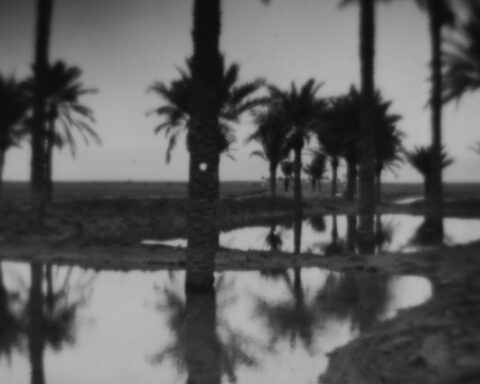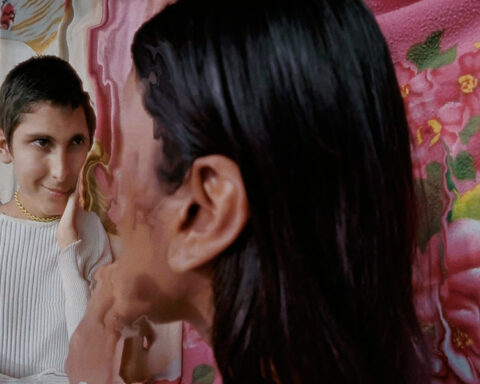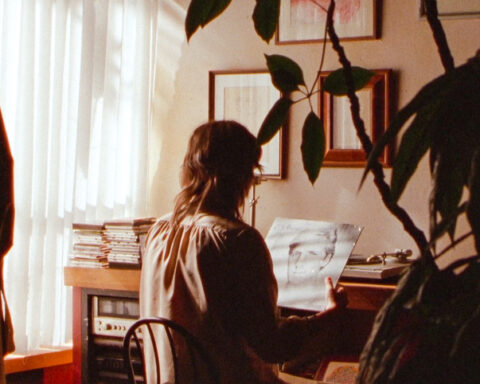Over this evening and the next, staunch filmmaker and author Julian Samuel will have two of his major documentaries screened at TIFF Bell Lightbox. Both take on the subject of libraries: where they’ve been and what their current incarnation means to society and—dare I say it?—civilization. The screenings are free but the talk in the films and, I suspect, afterward won’t be cheap.
Tonight, Samuel’s The Library in Crisis will screen as well as two experimental shorts, Formation and Schezo 1. The Library in Crisis is truly a talkie: it is a film about words, featuring experts on libraries. Though Samuel has made intriguing avant-garde films replete with visual experiments, this film is all about talking heads and what they say. The Library in Crisis features such experts as Fred Lerner, the author of The Story of Libraries, From the Invention of Writing to the Computer; Islamic historian Sumaiya Hamdami; Martin Dowding, then Assistant Professor, School of Library, Archival and Information Studies at University of British Columbia; Donald Gutstein, author of E.Con, How the Internet Undermines Democracy; and Ian MacLachlan, then Chair of Cultural Studies at Trent University.
Samuel’s set of experts takes us back to ancient libraries that existed in India and other Asian countries, moves us through the impact of the printing press and the heyday of the printed word and on to the present, with the overwhelming presence of the digital age. Libraries, we learn, have always been safe harbours where students and impassioned readers could find a place to read and study.
But now things have changed. The library no longer houses books. Libraries have become community centres, where one can access free computers, attend meetings and perhaps even hear a reading. The books—the raison d’etre—have been reduced in status and often have to be accessed days later, after a reader requests a print edition.
Samuel’s The Library in Crisis was made in 2002 but is remarkably astute in detailing many of the current problems for libraries and readers and lovers of democracy. In a world that expects everything to be streaming, what will happen not just to libraries but to the notion of an intelligent citizenry? Perhaps this article on Samuel should have been entitled “Wither the Library,” because that’s what we currently see: the amount of books shrinking from the shelves of even the trendiest of new libraries.
Tomorrow, Samuel’s feature doc Save and Burn will be screened; it is a follow up to The Library in Crisis and was made in 2004. Once again, we’re given a plethora of historical examples of the role that libraries played in such ancient civilizations as Egypt and offered a range of fascinating information on how these institutions have functioned through the centuries. It’s a pleasure to note that with Save and Burn, Samuel has resurrected his old experimental techniques.
The film is filled with interesting visuals which the audience can enjoy while listening to words by a host of experts in the library including Ambassador Taher Khalifa, Director, Bibliotheca Alexandria; Robin Adams, Librarian and College Archivist at Dublin’s Trinity College; Bernard Meehan, Keeper of Manuscripts, at Trinity College; Declan Kiberd, author of Inventing Ireland; David Grattan, Manager of the Canadian Conservation Institute in Ottawa; John Feather, Professor of Library & Information Studies at Loughborough University and author of The Information Society; Alistair Black, Professor of Library History, Leeds Metropolitan University, London; Erling Bergan, Editor, Librarians Union of Norway, Olso Peter Hoare, library historian and adviser on historic libraries, Bromley House Library, Nottingham; and Tom Twiss, Government Information Librarian, University of Pittsburgh.
The main thrust of Samuel’s thesis is that the library has been a progressive force in society, not a conservative one. It was the location that British socialists worked towards making a safe space where working class people could learn about the world—and possibly to decide to change things. He looks at the tragedy of the destruction of the Koranic Library in Iraq and its negative effect on a culture that was trying to re-establish democracy.
“Libraries are extremely important when creating a doctrine; if you destroy [a culture’s] library you destroy the ability of [that] society,” said Samuel, in an interview back in the Reagan/Bush era. “Nowadays, the orchestra is playing ‘terrorism,’ and when they play terrorism, anything can come under the conductor’s sword.”
This is a rare opportunity for Torontonians to consider the library as an institution that should be preserved. I urge you to see Julian Samuel’s docs.











